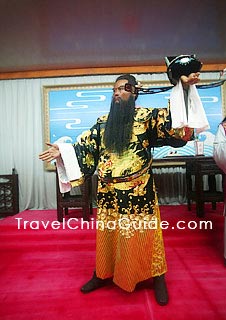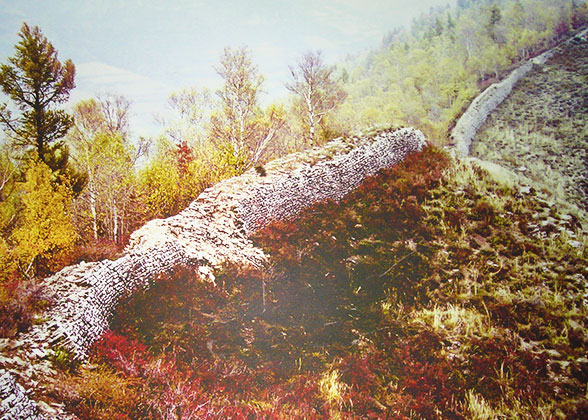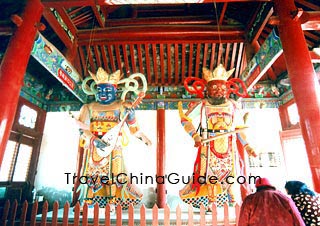Song Dynasty
 |
| Wax statue of Lord Bao, an upright official in the Northern Song Dynasty |
The Northern Song was founded by Zhao Kuangyin, a military general in the Latter Zhou (951 - 960). In 960, Zhao Kuangyin launched a mutiny in Chenqiao county (in current Henan Province).It was not long before the last king of the Latter Zhou was forced to abdicate. Thus a new dynasty - Song was established in Kaifeng. In that period, most part of China's territory was unified. However, in late Northern Song, the political corruption was serious and the regime began to decline. In 1127, it was destroyed by the Jin (1115 - 1234).
The Southern Song was set up by Zhao Gou, son of the last emperor of Northern Song. After Jin defeated the Northern Song, many imperial clansmen were captured by Jin's army. Fortunately, Zhao Gou had a luck escape. In 1127, he fled to Nanjing Yingtianfu (in current Shangqiu of Henan Province) and established the Southern Song Dynasty there. Later, the capital city was moved to Lin'an (currently Hangzhou City in Zhejiang Province).The Southern Song's regime was subject to the Jin. Many patriotic generals were killed in the late period. In 1279, the army of the Yuan Dynasty captured Lin'an, putting the Southern Song to an end.
Generally, the Song Dynasty was prosperous in many respects of the society. In agriculture, the productive technology was improved which promoted the output of food; in handicraft industry, the division of labor became more detailed which made the handicrafts technology reach an advanced level; additionally, the development of the commodity economy exceeded the previous level. Particularly, the earliest paper currency appeared at that period.
As for the development of science and culture, tremendous achievements were made during this period. Two of China's four great inventions - typography and compass were both invented and the application of gunpowder also developed rapidly. With regard to literature, a large number of outstanding scholars and poets, such as Zhuxi, Ouyang Xiu, Su Shi, Sima Guang and Shen Kuo, emerged and built up the splendid cultural atmosphere of the Song Dynasty.
|
|
Emperors
| Order | Name | Notes | Reign Time (years) | |||
|---|---|---|---|---|---|---|
| Northern Song (960 - 1127) | ||||||
| 1 | Song Taizu (Zhao Kuangyin) | Formerly the leading general of the Latter Zhou (951 - 960); He usurped the throne and founded the Song Dynasty by launching a coup. | 960 - 976 | |||
| 2 | Song Taizong (Zhao Guangyi) | The younger brother of Zhao Kuangyin; during his reign, the whole China was unified by his defeating the Northern Han (951 - 979). | 976 - 997 | |||
| 3 | Song Zhenzong (Zhao Heng) | Son of Emperor Taizong; In his reign, the military power of Song was strengthened but he signed the first humiliating treaty with the Liao (916 - 1125). Especially, he founded the famous ceramic kiln in Jingdezhen. | 997 - 1022 | |||
| 4 | Song Renzong (Zhao Zhen) | Son of Emperor Zhenzong; His reign was the turning point of the Song Dynasty from the prosperity to the disintegration. | 1022 - 1063 | |||
| 5 | Song Yingzong (Zhao Shu) | Son of one of the imperial clansmen and was adopted by Emperor Renzong; Actually, Emperor Yingzong's father was the first cousin of Emperor Renzong. | 1063 - 1067 | |||
| 6 | Song Shenzong (Zhao Xu1) | During his reign, he appointed Wang Anshi as Chancellor who presented a series of reform policy. He tried to expel Xixia (a contemporary kingdom of the Northern Song) troops out of the Song's territory but it was in vain. | 1067 - 1085 | |||
| 7 | Song Zhezong (Zhao Xu3) | Son of Emperor Zhenzong; In his reign, a conventional chancellor named Sima Guang was appointed, who once halted the reform policy put forth by Wang Anshi. | 1085 - 1100 | |||
| 8 | Song Huizong (Zhao Ji) | The 11th son of Emperor Shenzong; one of the few monarchs who favored Taoism and against Buddhism; As an emperor, he was more well-known as a painter, poet, calligrapher and musician. | 1100 - 1125 | |||
| 9 | Song Qinzong (Zhao Huan) | The eldest son of Emperor Huizong; He ascended to the throne after his father abdicated. However, the Song court was defeated by the Jin army in 1127 after which both Qinzong and Huizong were demoted to commoner. | 1126 - 1127 | |||
| Southern Song (1127 - 1279) | ||||||
| 10 | Song Gaozong (Zhao Gou) | The ninth son of Emperor Huizong who escaped the capture of the Jin court; He founded the weak Northern Song in Lin'an (currently Hangzhou). | 1127 - 1162 | |||
| 11 | Song Xiaozong (Zhao Shen) | He belonged to the seventh generation descendants of Emperor Taizu. | 1162 - 1189 | |||
| 12 | Song Guangzong (Zhao Dun) | The present Chongqing City was originally named by Guangzong, meaning ‘double celebration'. | 1189 - 1194 | |||
| 13 | Song Ningzong (Zhao Kuo) | In his reign, the cultural and intellectual achievements were abundant. | 1194 - 1224 | |||
| 14 | Song Lizong (Zhao Yun) | He was not interested in state affairs. In his reign, the Jin (1115 - 1234) was destroyed in 1234. | 1224 - 1264 | |||
| 15 | Song Duzong (Zhao Qi) | Nephew of Emperor Lizong; His reign was full of rebellions and war affairs. | 1264 - 1274 | |||
| 16 | Song Gongdi (Zhao Xi'an) | Son of Emperor Duzong; His reign lasted for only two years then he abdicated to his elder brother. | 1275 - 1276 | |||
| 17 | Song Duanzong (Zhao Shi) | Son of Emperor Duzong; His reign also lasted for two years till his death. | 1276 - 1278 | |||
| 18 | Song Weiwang (Zhao Bing) | Younger brother of Duanzong and died at eight; Chancellor Lu Xiu carried him jumping into the sea after the Yuan army's invasion. | 1278 - 1279 | |||
- Last updated on Apr. 23, 2023 -

